Existing User Log In
New User Registration
Register for a free account to gain full access to the VGChartz Network and join our thriving community.



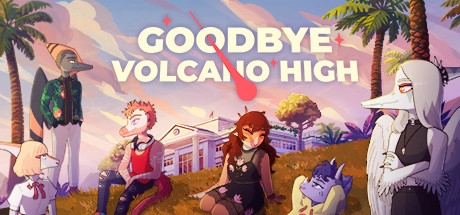

America - Front
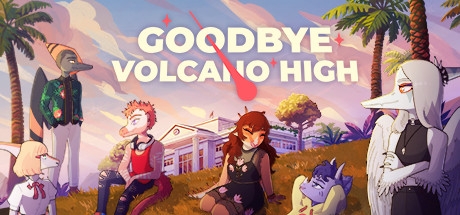

America - Back

KO_OP Mode
Adventure
| Owners: | 0 |
| Favorite: | 0 |
| Tracked: | 0 |
| Wishlist: | 0 |
| Now Playing: | 0 |
Reviewer's Note: Given some of my critiques, there's no other way than to dive into some critical story SPOILERS. Read on at your own risk.
There's something so narratively appealing about the high school setting. It's the final staging area into adulthood, with all of the potential highs and lows that come with it. "What are your future plans after graduation?" "Will we still hang out together?" "Will my/your pursuits get in the way of that?" A plethora of questions thrust upon you to navigate during the most hormonally-intense span of everyone's life. Trivial mistakes can unwind you enough to think the world is ending.
Such apocalyptic language is treated quite literally in KO_OP's visual novel. As an extinction-level asteroid hurtles to Pangea (Earth), this world of anthropomorphic dinosaurs grapple with the impending doom. Although the initial discovery doesn't guarantee it will make impact, the frequent electrical outages presage it as a strong likelihood. How can one think of anything else like future dreams, let alone schoolwork, in the face of this news? But before facing such an existential crisis, our pterodactyl protagonist, Fang, is more concerned with navigating senior year and winning the Battle of the Bands.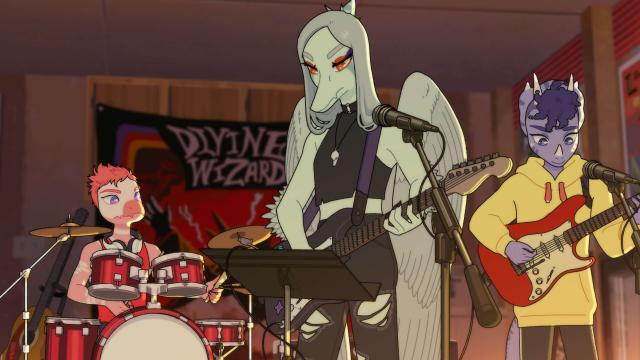
The beginning gives an interesting portrait of Fang's mindset: adjusting two sets of dialogue choices to craft the chorus for a new song. The alterations are subtle, in order to ensure any selection will rhyme, but each option tries to leverage some intense emotion. This type of intensity is what spurned the local music taste-maker, known as LJ, into considering Worm Drama for the pre-trial competition. The only problem is Worm Drama's three-piece set, of Fang, Trish, and Reid isn't initially on the same page about the tonal shift from caustic punk to a more melodic alt rock. Their split over the summer also reveals who still has two feet in for this creative endeavor and who doesn't.
That disparity between low-stakes teenage band drama, high-school relationships, and existential dread is the sort of precarious line also seen in titles like Life Is Strange: Season One. Even its mere mention is enough to remind players of French late-thirty-somethings trying to write high-schoolers from Portlandia; turns out there are worse options, like native millennials trying to write high-schoolers from Portlandia. Beyond the tawdry current-day syntax consistently layered with Cali-flavored smarminess, there's something about the way characters descant over anything that'll distract from the main plot. To be fair, hopping between different topics connects with the chaotic time of high school, but Volcano's execution could've been done without making me want to pulverize the little snail nestled within my inner ear.
To avoid over-indulging in hyperbole, you can see where Kyle McKernan and Jenna Yow’s lumpy, uncoordinated script works by measuring its better detours. The brightest example is actually tied to what's distracting Reid: this world's D&D rip-off (Legends & Lore). While, yes, these sessions don't progress the plot, you see how the Sword of Damocles hurtling through space fuses with Reid's L&L narrative over time. Instead of characters clumsily dumping their thoughts out like “oh, what’s the point of anything now?” to the homeroom teacher, you see them psychologically wrestling with a doomed future. That's the difference between trying to earn attention rather than adding more content for its own sake.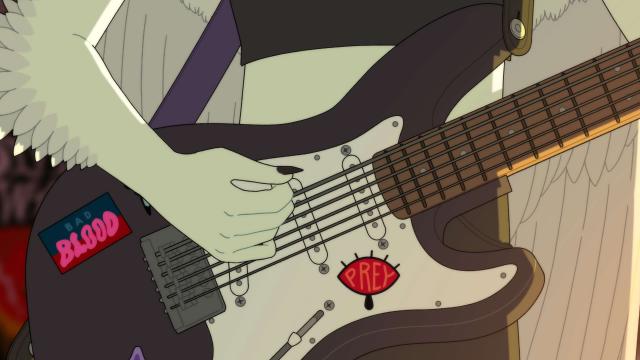
Sadly, this is layered on top of lackluster presentation. Even though I'd say the art design is… nice for that type of twee-hipster look featuring "dino-furries," the stilted animations diminish its appeal. It's like a dozen paper-cuts from minor bugs, iffy lip-syncing, and poor mise en scène (as if I wasn't sounding pretentious enough). I wasn't a huge fan of The Wreck, but I appreciate how it creatively cut corners in hindsight – especially how individual frames flowed together. With consistent splicing and background sound design, your brain could infer the gaps between still images in a way Volcano can't muster with full animation; instead, your mind gets intuitively confused at how millions of years of evolution caused these humanoid-dinos to look so robotic. Past that, dialogue pacing often feels mismatched thanks to small pregnant pauses throughout, as if each voice actor is waiting until they're handed the talking stick; worse yet, I wanted to yank the talking stick from several side characters.
Volcano's over-arching issues stem back to making a "character-centric" story where so little happens until the final act. It feels like a weird trend where some initial selling point is made (such as this asteroid), characters spend hours emotionally exploring their lives with little change, and then sprinting towards the end with some development. This game takes 6-7 hours to complete and over half is spent worrying about Worm Drama's status. Will they/won't they succeed at their dreams and stay together? No matter how much allegedly comedic & quirky banter is sprinkled in between, this script had no right spinning its wheels for that long. Aside from a "mysterious" texter professing deep feelings for Fang, that push/pull is the main tension dragged out until several threads are hurriedly wrapped up before the finale. Certain detours do tap into the emotional crises everyone is facing - with the rare poignant moment - but its general aimlessness makes the maudlin conclusion feel unearned.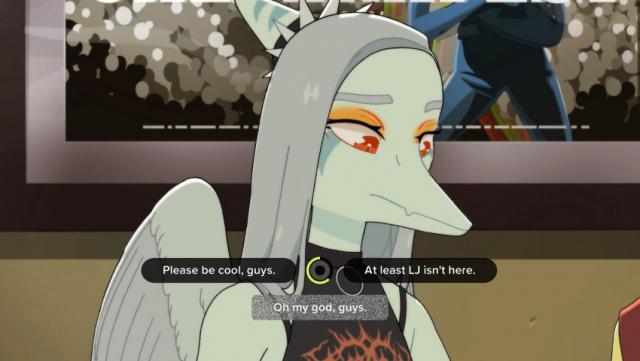
What's funny is I actually gravitated more towards the design than the narrative. That's peculiar for a visual novel, especially when the baseline expectation is dialogue choices and… maybe some mini-games. Granted, that's mostly the case here, but there's some interesting context woven in. When I say "dialogue choices," it's important to preface this: don't buy the tagline. It's more about the presentation of Fang navigating the moment than the wider ripple effects. As seen with clever UI visuals, anyone can delineate between a neutral, jagged, gleaming, or fiery response. Sometimes the placing will get shuffled or even outright ignored by Fang's own thoughts (seen with the white noise TV background), removing the choice altogether. I can understand any player's aversion to false choices, but I think it's a neat subversion of how we view the player-character. It presents a dialogue of just how much ownership you have with some decisions.
The main gameplay draw is the rhythm-focused interludes where Fang and/or Worm Drama jam out. There are three distinct control schemes to consider: holding left-stick up, left, or right as white balls come from those directions, hitting face buttons at the correct time, and jamming both control sticks down in sequence. Where it gets interesting is when KO_OP blends them together. So, you have to follow the white puff balls towards the bottom screen while hitting a chained face-button sequence in tandem. A little like patting your head and rubbing your belly at the same time. While by no means difficult (even when chaining button prompts), the main detraction stems from cutscenes overlaying with the rhythm gameplay. I understand trying to capture an immersive concert experience, especially with its surprisingly-good tunes, but the layout didn't have to look so visually busy.
Given the genre, it's less about having deep mechanics and more about the nuances to appreciate this world, with even little details like the Twitter (or "X") knock-off finding a way to accurately annoy you with users' outdated memes and useless banter. There's not much, but just enough extraneous stuff for this foundation to work with more tweaks and a decent story.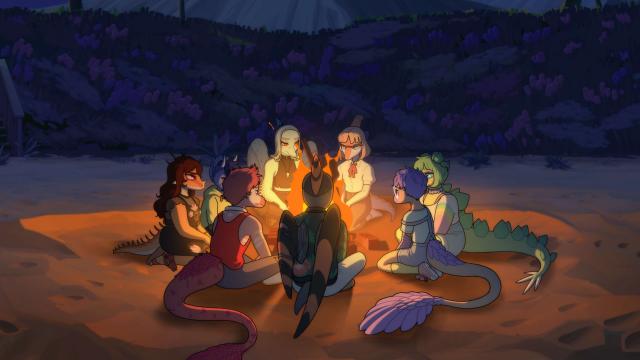
In the end, KO_OP's cataclysmic shortcoming comes back to the script. I'll admit: there's a serviceable gameplay foundation – especially its rhythm template – which lends it some character and sincerity; given how limited that quality typically is for a visual novel, it’s a tough sell when the context propelling the game forward typically feels disjointed and uninteresting. I know it's smarmy to say "it's more parts insufferable than endearing," but there's only so much emotion you can squeeze from its good bits in the face of wonky pacing, several empty characters, cringe-inducing dialogue, and an unearned sense of accomplishment. If our Mesozoic Era looked anything like Goodbye Volcano High, I'd say there's a bright side to their apocalypse: we got oil in exchange.
Contractor by trade and writer by hobby, Lee's obnoxious criticisms have found a way to be featured across several gaming sites: N4G, VGChartz, Gaming Nexus, DarkStation, and TechRaptor! He started gaming in the mid-90s and has had the privilege in playing many games across a plethora of platforms. Reader warning: each click given to his articles only helps to inflate his Texas-sized ego. Proceed with caution.









